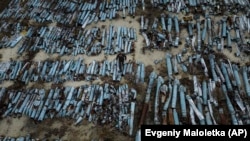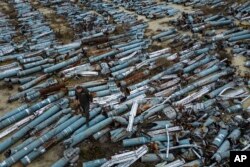On July 7, the United States announced it would send cluster munitions to Ukraine as part of its latest $800 million security assistance package.
Dual-purpose improved conventional munitions, commonly called cluster munitions, are a type of weapon, dropped from planes or fired from the ground, that are designed to open mid-air and release smaller submunitions or bomblets that disperse over a wide area. The cluster munitions the U.S. is sending to Ukraine will be encased in 155 mm artillery shells.
A 2008 International Convention on Cluster Munitions prohibits use of this weapon due to the potential risks it poses to the noncombatants.
Both Russia and Ukraine have used cluster bombs in the ongoing war, the U.S.-based Human Rights Watch reported on July 6. The rights watchdog urged President Joe Biden's administration not to send the weapon to Ukraine, saying such bombs have already killed scores of civilians since the Kremlin launched its clandestine war in 2014.
U.S. allies who are signatories to the Convention on Cluster Munitions expressed concern over Washington's decision to arm Ukraine with them. Some U.S. Democrats and progressive media outlets joined in the criticism.
Russia, which is not a signatory to the convention, also reacted harshly to the move.
"We have taken note of the Director for Strategic Communications of the NSC (National Security Council) John Kirby's statements about the provision of cluster munitions to Ukraine. The official de facto confessed to the United States committing war crimes during the Ukrainian conflict," the Embassy of Russia in the USA wrote on Telegram.
That is false.
The Russian Embassy misquoted Kirby and used words he never said to amplify the Kremlin's disinformation about U.S. actions in Ukraine.
Speaking with ABC "This Week," Kirby said:
"I think we can all agree that more civilians have been and will continue to be killed by Russian forces — whether it's cluster munitions, drones, missile attacks or just frontal assaults — than will likely be hurt by the use of these cluster munitions fired at Russian positions inside Ukrainian territory."
Kirby told ABC that "We are very mindful of the concerns about civilian casualties and unexploded ordnance being picked up by civilians or children and being hurt. Of course, we're mindful of that. And we're going to focus with Ukraine on de-mining."
He and other U.S. officials emphasized that the type of weapon the U.S. is sending to Ukraine has a low percentage of failed or delayed explosions.
The Pentagon says the "newly fielded munitions" will allow "Ukraine to target broad swaths of entrenched Russian troops and equipment."
Ukrainian officials and government advisers welcome the weapons. Mykhailo Podolyak, a senior adviser to the Ukrainian president, Volodymyr Zelenskyy, lashed out at those criticizing Ukraine for seeking every means available to defend itself against a “brutal genocidal war."
Ukrainian Defense Minister Oleksii Reznikov said Ukrainian forces will not use cluster munitions in urban areas and will only use them "to break through the enemy defense lines."
While submunitions are designed to explode above the ground or upon impact, some of them fail to do so, leaving them as a potential threat to civilian life. Unexploded bomblets dropped by the U.S. over Cambodia, Laos and Vietnam during the Vietnam War continue to kill and maim decades on. The U.S. also used cluster munitions in Afghanistan and Iraq.
The lingering threat to civilian life the munitions pose has led 123 states —111 state parties and 12 signatories — to join the Convention on Cluster Munitions, which prevents them from using, developing, producing, acquiring, stockpiling, keeping or transferring cluster munitions.
Russian state media has been reporting on voices in the West legitimately concerned about the use of cluster munitions without mentioning that Russia has been using cluster munitions since first invading Ukraine in 2014.
In 2016, Russian Foreign Minister Sergey Lavrov justified the use of cluster munitions as a "legal means of warfare."
Apart from Ukraine, Russia also used cluster munitions during its wars in Chechnya, Georgia and Syria, at times directly targeting civilians.
Russian state media has also at times reported that the U.S. and Ukraine are not signatories to the 2008 Convention on Cluster Munitions while omitting the fact that Russia is also not a signatory.
On July 11, Russian Defense Minister Sergei Shoigu threatened to use cluster munitions against Ukraine if Washington delivered them to Kyiv, falsely claiming Russia has not used them.
Russia's use of cluster munitions in Ukraine has been extensive, "causing many civilian deaths and serious injuries," a report from Human Rights Watch released on July 6 said. That report found Ukraine had also used the weapons, causing death and injures to civilians.
Stark images taken by Associated Press photographer Evgeniy Maloletka show more than a thousand remnants of Russian cluster munition rockets used to attack the city of Kharkiv laid out in a field.
Dmytro Chubenko, spokesperson for the Kharkiv region's Prosecutor Office, told the Associated Press the remnants in the "missile cemetery" had been used to attack "residential areas," calling them "pieces of evidence that an international criminal court would use."
The same Russian general who led that assault on Kharkiv, Colonel General Alexander Zhuravlyov, "oversaw one of the most brutal chapters of Syria's war," with a massive uptick in the use of cluster munitions that disseminated civilian areas, a CNN investigation found.
An August 2022 report released by Human Rights Watch found that Russia had by that time already launched hundreds of cluster munition attacks in at least 10 of Ukraine's 24 regions.
Perhaps most infamously, on April 8, 2022, Russia attacked Kramatorsk railway station with a ballistic missile equipped with a cluster munition warhead, reportedly killing 63 people and injuring scores more.
The United Nations, media outlets, investigative journalists and other rights groups have also documented Russia's indiscriminate use of cluster munitions in Ukraine.







